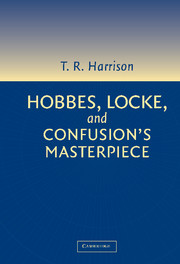 Hobbes, Locke, and Confusion's Masterpiece
Hobbes, Locke, and Confusion's Masterpiece 5 - War and Peace: Grotius and Pufendorf
Published online by Cambridge University Press: 05 June 2012
Summary
In our discussion of Hobbes, we have seen the problems posed by moral and political scepticism and the radical nature of his response. In the first chapter, it was noted that Hobbes first became aware of the force of this problem, and started formulating his answers while in Paris in the 1630s in the circle around Marin Mersenne, whose best known member is Descartes. As we saw, the Mersenne circle was reacting to the French sceptics of the previous generation such as Montaigne and Charron, who held that we should live by the appearances, follow the customs. The problem was that this seemed to abolish the objectivity of justice. As Charron put it (and was quoted in the first chapter), ‘laws and customs are maintained in credit, not because they are just and good, but because they are laws and customs: this is the mystical foundation of their authority, they have no other’. With Hobbes, we have seen one response, first formulated in Paris, to get beyond such mere customs and to refound a universal natural law. In this chapter, we shall look at two other responses, those of Grotius and Pufendorf. Since the problems and the time are the same, there are similarities as well as important differences between these treatments and Hobbes; however, I shall not in general make comparisons. This is a new shot at the problem, to be treated on its own terms.
- Type
- Chapter
- Information
- Hobbes, Locke, and Confusion's MasterpieceAn Examination of Seventeenth-Century Political Philosophy, pp. 132 - 162Publisher: Cambridge University PressPrint publication year: 2002


